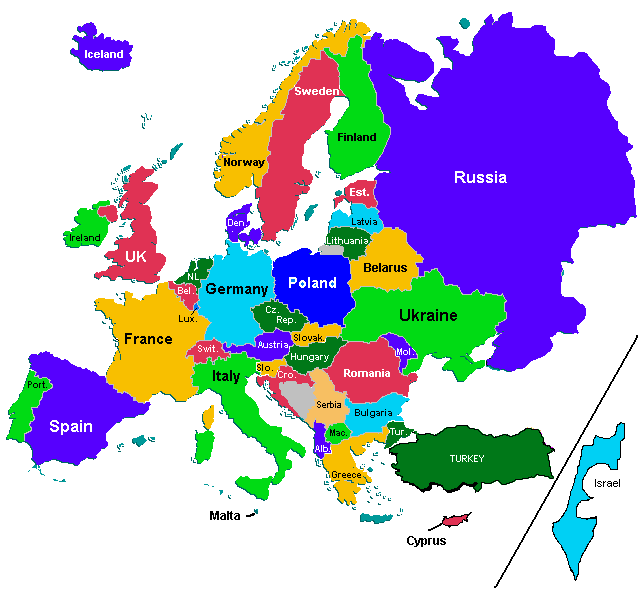When travelling around Europe you need to realize that, unlike the US mainland, from north to south, you are not travelling through a series of contiguous states. In Europe, each state-sized country is – well, what it says – a country. Each country has its own government, its own legislation, its own borders and cultures and, until recently, its own individual currency. The currency is now Euros throughout Europe and the Republic of Ireland and is accepted as a dual currency on the Isle of Man. In the United Kingdom, however, Euros need to be exchanged for pounds sterling which, at the present time, do not have a particularly good exchange rate.
In every country throughout Europe, however, you can live the high life or you can travel around inconspicuously, living like the local people do and spending far less money with little compromise to lowering standards. Naturally, you can stay in hotels which could work out expensive, or you can stay in youth hostels with varying degrees of comfort, although long-term, this is not a particularly cost-effective option either. However, you can also consider renting apartments while travelling. This is much more feasible and is an option many European families consider themselves when they are travelling. Europeans call this kind of holiday ‘self-catering’ for obvious reasons. 
Many websites are devoted to real estate rentals. If you are in Holland [the Netherlands] try the website Kamermet.nl, for France the website devoted to rental options is PAP.fr, in Italy there is VivaStreet.it. These are just the tip of the iceberg. There are many more. It would help, however, to understand the language so that you can read the advertisements on those websites. As an example, in most European countries, you can expect to pay around Euros 350 per week although, in some major cities like Madrid, the rents can be considerably more.
One excellent way of finding short-term rental apartments to let on a weekly or monthly basis is to look in the English language newspapers such as The Costa Times which is published online by British ex-pats living in Spain. Similar English language newspapers in other countries are also available online and all of them feature a classifieds’ section with apartments to let [usually called flats to let].
These are owned by Brits returning to the UK for a few months or who own them as holiday homes and want to rent them out when they return home in order to make a bit of money to help with maintenance costs. British holiday homes are available throughout the European continent, as are holiday homes owned by Scandinavians and Spanish, Italian and French holiday homes owned by professional people who usually live in Madrid, Rome and Paris respectively.
The beauty of renting holiday homes is that they are all furnished, even down to the pots and pans, refrigerator, cooker and all the electrical appliances. All you really need to do to make yourself comfortable is purchase your food, buy a bottle of wine or two, pay your rent [usually with a deposit equaling one month’s rent which is returnable at the end of your tenure] and then settle down to enjoy the country you are now a temporary citizen of and get to know the culture and meet your neighbors.
Apart from being a far more cost-effective way of visiting Europe, you will feel far more integrated when renting your own place. If you are just drifting from hotel to hotel you never really feel as if you have put down any roots, and you live through a featureless visit just as a tourist, without any real distinguishing factors that later stand out in your memory and remind you that once you lived in Europe.